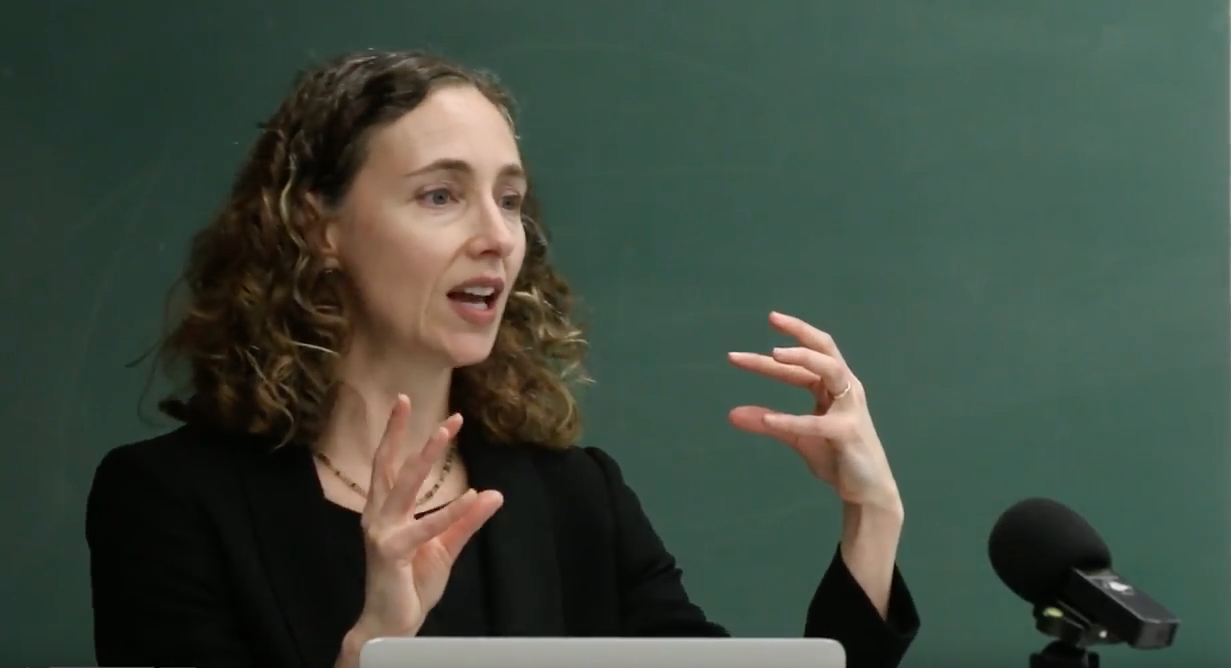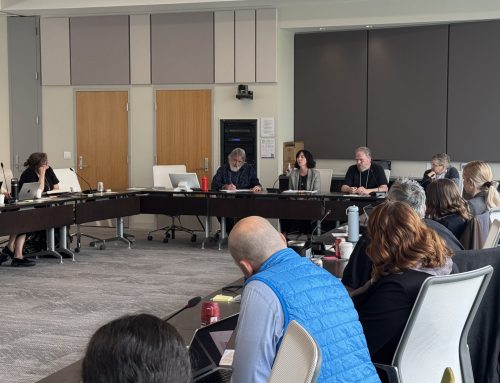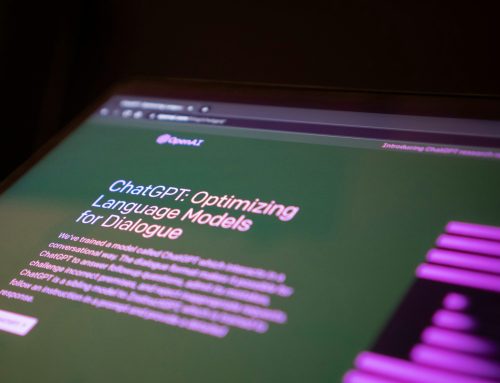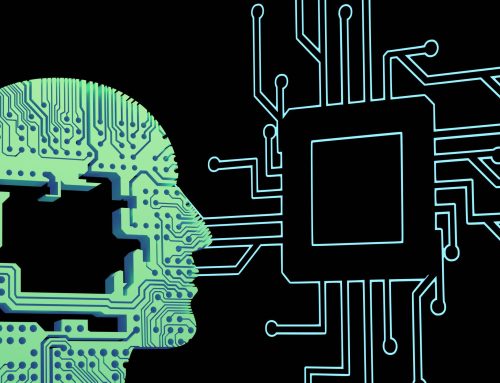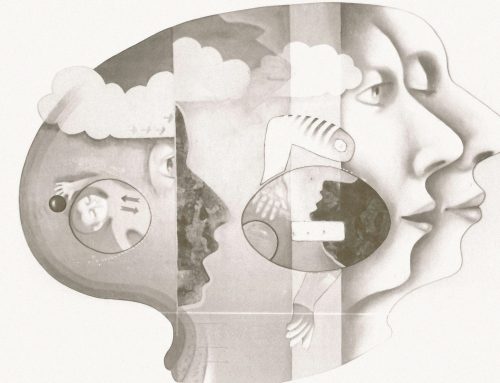Hanna Pickard is a Reader in Philosophy at the University of Birmingham, where she specializes in philosophy of mind and psychiatry and clinical ethics. Additionally, she works as a therapist for a NHS specialist service for people with personality disorder and complex needs. Professor Pickard visited the Rotman Institute of Philosophy from April 6-7, 2017.
Prior to her talk, Why Do Addicts Use? Getting Real about Drugs, Identity, and Adversity, Professor Pickard graciously sat down with Rotman member Meghan Winsby for the following interview.
Meghan Winsby (MW): Thank you for being here! Can you explain the “neurobiological myth” surrounding addiction?
Hanna Pickard (HP): The “neurobiological myth,” as I think it is—although of course not everyone does—is that drug addiction is a brain disease. (some recent work on this issue by Hanna and others here). So, the explanation of the basic personal-level symptom, which is persistent drug use in the face of negative consequences, is that long-term heavy drug use has caused changes to the brain. This means that addicts’ capacity for choice is bypassed and the pathology in their brain causes the behavior. So, the explanation of the behavior is neurobiological, and not at the personal level. The reason why I—and some others at least—think this is a myth is that we have good evidence that this is just not true. Although the brain does change from long-term drug use, there are two points that are important here. One is that choice is nonetheless retained, so we don’t have the bypassing of personal level psychological states as part of the causal explanation of the behavior. The second is that, in my view, it is unclear whether the brain changes should count as pathological. There’s a lot of change, a lot of difference and atypicality that we don’t think of as pathology. It’s a very contested question what pathology actually is, and it may turn out that’s the appropriate way to see these changes, but I don’t think we know that yet.
MW: What is an example of a negative effect this myth has on our understanding of the addicted patient?
HP: So if we really hone in on the patient and what a person needs to do to address problematic drug use, the effect is really profound. A big problem is that patients internalize the neurobiological myth, and when they do that, they lose their own sense of agency for change.
If it’s true that choice is part of the explanation of drug use, then patients need to make a different choice to stop—they need to choose differently to change the addictive pattern of behavior. But, if patients themselves believe, and the clinicians working with them believe, that choice has nothing to do with addiction—it’s a neurobiological disease of compulsion—they can’t rationally decide to choose to do anything different. So, the myth is really destructive to patients’ own capacity to take hold of their addiction and make changes in their own interests for the future. It keeps people stuck in a disempowered helplessness. It keeps them in the sick role. Basically, they have no power. What they have to do is just what the doctor orders—normally, they must take their medication—and the power and knowledge that will provide the cure is found in the clinicians and their prescribed treatments. So, if patients put themselves and are put by clinicians into a sick role, they lose their own capacity for empowerment and change. The myth is damaging—it’s not just an academic problem, it’s a real world problem as well.
MW: Classic compatibilism about free will and responsibility hold that the addicted patient lacks a certain freedom owing to internal constraints on her agency. That is to say, she lacks the ability to do otherwise. In your view, how does this characterization hold up?
HP: Whether addicts have the power to do otherwise–whether any of us has the power to do otherwise–depends on what we mean by that. So I’m going to put aside a notion of power to do otherwise which requires a libertarian notion of free will as distinct from determinism. If we don’t have that, addicts don’t have that either, so that’s just not what’s at stake here. The classic way that I take a compatibilist notion of a power to do otherwise to be understood is that the behavior is responsive to incentives. So if you’re a philosopher you might talk about reasons-responsiveness, if you’re a psychologist you might talk about outcomes and positive and negative reinforcement.
I think because of the dominance of the neurobiological myth on all our thinking, in the philosophical compatibilist literature, people have typically claimed that addicts are not responsive to incentives. Addicts are thought to have an irresistible desire to take drugs, which they literally cannot but act on. So, if that were true, we would have in addicts a sort of compatibilist view of what it is to lack the power to do otherwise. Addicts would lack what the rest of us have, namely, responsiveness to incentives or reasons-responsiveness.
But, in fact, empirically that’s false. Addicts are responsive to incentives. They use drugs for reasons and actually show quite a lot of behavioral flexibility and capacity to adjust their use in light of immediate circumstances, incentives, and positive and negative reinforcement. One of the really nice illustrations of this is a new form of treatment called contingency management treatment (CM), which interestingly has much greater success than many other forms of treatment for addiction, and which works through a positive reward structure for abstinence. Just the presence of the reward possibility means that you get much more treatment compliance. Now there are a lot of really interesting questions about how exactly CM treatment works and why, but with even a little bit of positive reward to motivate, it looks like even some of the most hardcore addicts feel able to not use. They feel able to do otherwise.
MW: If someone has had a clinical diagnosis, or has otherwise revealed herself to be substance-addicted, we tend to understand this diagnosis/condition as excusing to some extent—or responsibility-mitigating. Consequently, we see addiction as a blame-mitigating factor. Do you/how do you see these two responses coming apart?
HP: There is a different strand of my research about the difference between responsibility and blame, which I recently brought together with my work on addiction, in a paper published in Neuroethics (Jan., 2017) called “Responsibility Without Blame for Addiction.” To answer your direct question, I think when we talk about blame mitigation, or we talk about whether someone is to blame, that’s ambiguous between two things we might mean. We might be asking whether they’re blameworthy—which, to give a basic gloss, is going to mean something like whether they are responsible for wrongdoing or harm. Or, we might be asking whether we should blame them, where blame here is a typical human set of thoughts, emotions, behavioural dispositions, which we have when we think someone is responsible for wrongdoing or harm. And, in my view it is often—not always, but often, and we do always need to decide on a case-by-case basis—appropriate to hold even people with a disorder, including addiction, responsible for some of their behaviour that is wrong or causes harm. However, that doesn’t mean it is appropriate for us to blame them.
Setting aside ‘blameworthiness’—a philosopher’s word—the basic idea about distinguishing responsibility from blame is not complicated. Fundamentally, responsibility is about another person—in my view whether they had choice, control, sufficient understanding of what they were doing (but you could substitute in whatever your favorite account of responsibility is if you disagree with mine, apart from a Strawsonian or neo-Strawsonian account). Blame is about us, and how we do, or should, respond to a person when we hold them responsible. So, responsibility is about another person. Blame, in contrast, is about you, and how you respond to that person. My own view is that the question whether we should blame addicts is just entirely different from the question of whether they are responsible. Different factors bear on each of these questions.
On the question of blame: I think blame is rarely a helpful or productive reaction to have toward anyone, but especially someone who suffers the way addicts do.
On the question of responsibility: To be clear, I do not myself think taking drugs is in itself wrong, but it is unquestionable that addiction can do a great deal of damage to people’s lives – addicts themselves as well as other people, like their family and friends. Are addicts responsible for this damage? Again, sometimes the answer may be yes, but a lot of factors may mitigate their responsibility. One factor in particular is the suffering addicts undergo if they don’t use. So you might think that they’re excused by duress in a sense. This kind of excuse will depend on weighing the difficulty and damage of not using, against the cost and damage of using – sometimes the balance might mean addicts are justified in using. In addition, many addicts are people who come from underprivileged backgrounds of poor opportunity and often suffer from comorbid health problems. There are many reasons why this kind of socio-economic and psychological context should make us wonder about the appropriateness of responsibility ascriptions in many cases.
MW: In your talk today, you discuss the importance of supplementing our understanding of the neurobiological basis of addiction with a more expansive look at the value of drugs, the importance of a patient’s psycho-socio-economic context, and the role of narrative self-identity. Can you speak briefly to this approach?
HP: Here’s what unites all three things together. Once we see that we can’t explain drug use by appeal to underlying brain pathology because agency and choice are necessarily part of the explanation, we face this question: why, if addicts are able to choose not to use, do they persist in using despite negative consequences?
That’s the puzzle facing any choice model of addiction. In my view there are a number of different things that we need to appeal to in order to explain why addicts make those choices. Some of them have to do with the value of drugs—in other words, what drugs do for you. Drugs do many, many different things, but one core function relevant to addiction is that they relieve suffering and offer escape from stress and misery. So, imagine suffering terribly, whether psychologically or physically, and being in a socio-economic context where the alternatives available to aid your suffering or give you a better life are limited and poor. This is the typical psychological and socio-economic context of addiction. Drugs can provide something that nothing else does in that context. If this is right, then what’s the solution? Help addicts with their psychological and physical suffering to the best of our ability, and address the socio-economic context.
Self-identity is different. It’s something I’ve just started working on. I think it’s a really important component, which has thus far been undertheorized both in drug/addiction research and in philosophical work engaging with addiction. It goes back historically to sociological self-labeling theory and in particular, Harold Becker’s great work, Outsiders (1963). The thought is something like this. When you are a person who is labeled a certain way, other people have a set of expectations of you. And you have a set of expectations about yourself. If you think about the neurobiological myth, those expectations are going to be, “Once an addict, always an addict. There’s nothing I can do to change—there’s nothing that can be done to change me.” And of course, that message is often reinforced by society. So there’s a way in which self-identifying as an addict keeps you stuck because of the way it can limit your own sense of capacity for change. However, there is a further element that we need to think a lot more about, namely, that nonetheless it is an identity. We need to think more about the way in which addicts operate often in robust peer groups, where there are really meaningful relationships with other people. Addiction provides a daily routine and habit—a schedule for their lives. They have a knowledge set that they may value, including ways in which they can manage things or operate on the outskirts of society that others can’t. There’s a lot of potential value there, if you self-identify as an addict and also share a peer group. And this means that there is this fundamental, in ways terrifying, question you have to answer if you are to think of quitting: Who are you if you give that up? You have to construct a new identity, and that’s no easy task. So, again, that can be part of the explanation about why addicts continue to use drugs despite negative consequences. It’s not just about making the choice not to use this drug here and now. It’s about finding a self that you can happily inhabit in the future. This is a big ask. It’s a different kind of project.
MW: What are some specific ways drug policy can be reformed to better reflect this approach?
HP: Decriminalize, legalize, and make it a public education health priority.
MW: You’re not only a philosopher, but also a therapist! How has your role in the therapeutic community informed your philosophy, and vice versa?
HP: There’s a way of doing philosophy that takes our intuitions for granted and seeks, fundamentally, to confirm and justify them. For me, working clinically has brought a huge amount to many different dimensions of my philosophical research. But I think one thing I would single out is that it’s made me see first-hand that the basic approach of starting with our intuitions and looking to confirm or justify them—I almost want to say it is bad practice, philosophically. A lot of our intuitions are contingent products of the culture in which we live, and which don’t survive good moral scrutiny, and we can change them. This includes our moral dispositions. For me, seeing how differently people operate in a clinical context really brought that to the fore, and in some sense made me question that basic philosophical methodology.
MW: Is there any general advice you can give philosophers who aim to gain insights from this kind of real-world engagement?
HP: A lot of our beliefs and attitudes toward people who are different from us—who have mental disorders—are created through news media, film, television, literature, and as a result often manifest stereotypes as well as a kind of cultural mythology and false ideology. If you want to write about a particular kind of disorder, or a particular kind of person, go work with them! Volunteer some time. That’s a way both to do some good and also to make sure that you’re subjecting whatever intuitions, beliefs, potentially false ideologies you have to a real world empirical test, and it will make sure that your work proceeds with humanity.
MW: Thank you so much for your time.
Watch video of Hanna Pickard’s talk, “Why Do Addicts Use? Getting Real about Drugs, Identity, and Adversity”, on our event page or on the Rotman Institute YouTube channel.

